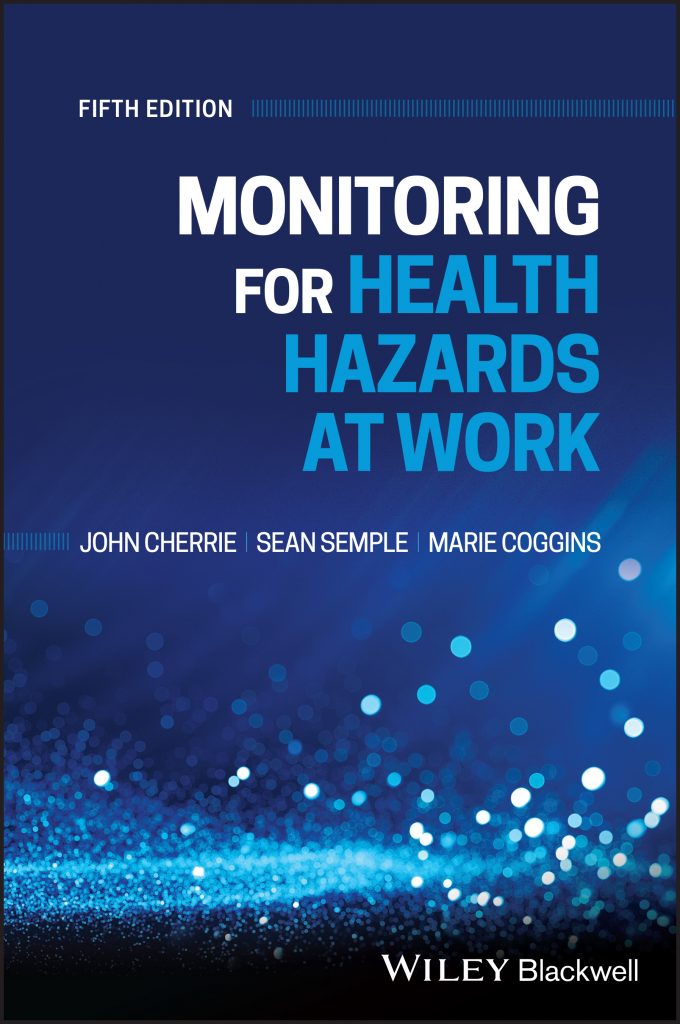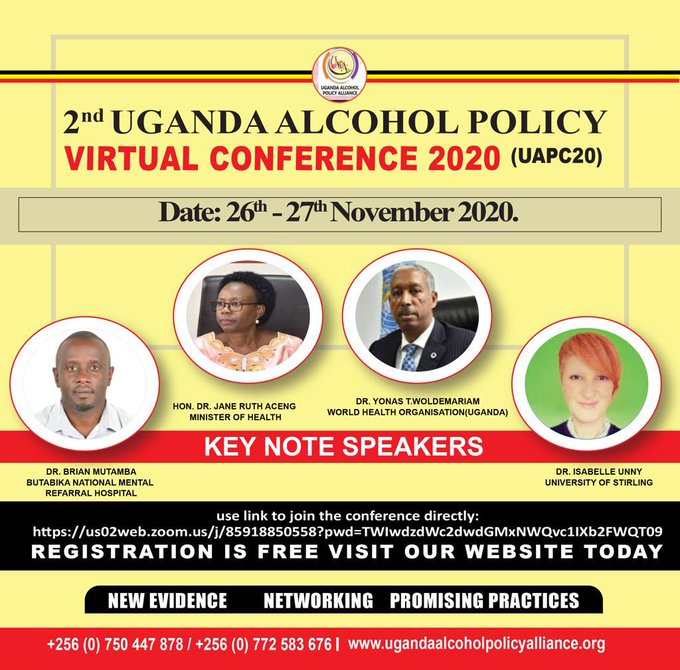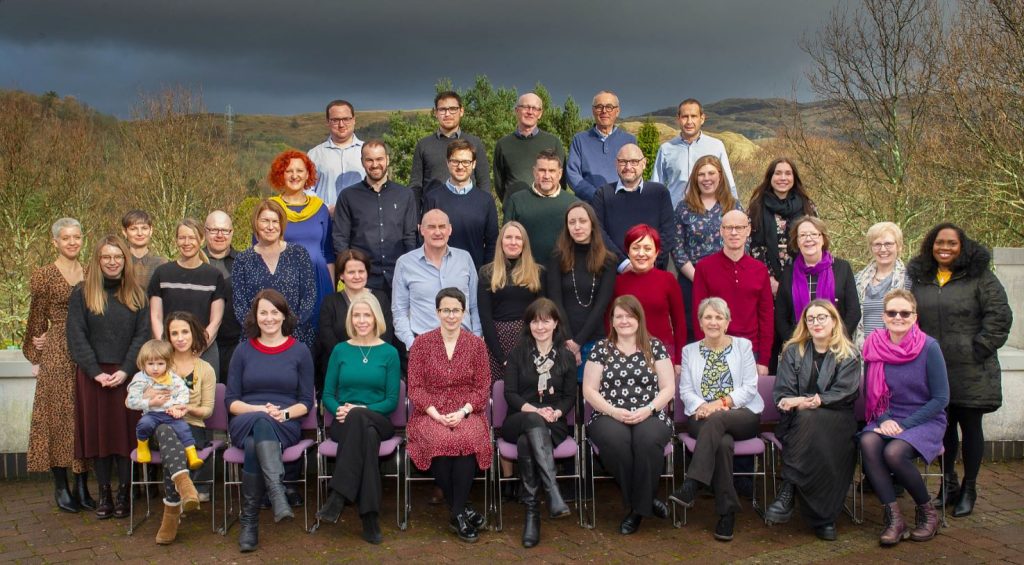Home » Articles posted by seansemple
Author Archives: seansemple
Monitoring for Health Hazards at Work, 5th Edition

ISMH’s Dr Sean Semple is co-author of a soon-to-be published textbook. This fifth edition of Monitoring Health Hazards at Work is aimed at those studying or carrying out the important task of protecting workers from hazards. It provides a clear explanation of how to approach problems in the workplace: how to identify hazards and how to quantify the risks through measurement. It does this with practical examples and checklists, and leads the reader through the steps required; often highlighting potential issues to avoid problems before they arise. The book covers all types of hazards that arise in the workplace and spans chemical hazards, biological agents and physical hazards. Where appropriate it also considers workplace comfort issues around the thermal environment and lighting. The main emphasis has always been on hazardous substances, which represents the main areas of work for most occupational hygiene practitioners. This revised fifth edition is now split into five sections with several additional new chapters. The book is co-authored with Professor John Cherrie from Heriot Watt University and Dr Marie Coggins from National University Ireland, Galway. It will be available from bookshops and online retailers from the 23rd March 2021.
Declaration of interest: Dr Sean Semple declares a financial interest and will receive royalties from the sale of this book.
New evidence review: alcohol screening and brief intervention in primary health care
A new open-access paper in Implementation Science, co-authored by ISMH colleagues, is the first review worldwide to identify the theoretical underpinnings of what keeps primary healthcare doctors and nurses from advising alcohol consumers on cutting down.
Alcohol is a leading global risk factor for disease and premature death. Evidence shows that although many drinkers would cut down or stop drinking if advised to do so by a primary health care doctor or nurse, the vast majority of them leave their primary care appointment without being screened and/or advised.
The study, led by Dr. Frederico Rosário of the University of Lisbon, was a systematic review of the literature to identify the barriers and facilitators to the delivery of alcohol screening and brief interventions in primary care. Alcohol brief interventions are short, non-confrontational conversations aiming to motivate drinkers to reduce their consumption and/or their risk of harm. Alcohol brief interventions have historically been preceded by the use of a screening questionnaire to assess an individual’s consumption level and risk of alcohol problems. The authors used behaviour change theory to provide a better understanding of how the barriers could be addressed in order to change practitioners’ behaviour.

The review found multiple barriers to implementation of alcohol screening and brief intervention delivery. Lack of time, low sense of self-efficacy (confidence in their abilities) and lack of specific knowledge and training were among the most commonly found. The findings show the multiple factors underpinning the low delivery of alcohol screening and brief interventions by primary care practitioners, suggesting that more complex implementation programmes addressing several barriers may be needed to successfully change practitioners’ behaviour. The findings from this study were used to design and trial a programme to increase the rates of alcohol screening and brief intervention delivery in primary care, the results of which are expected soon.
Dr. Frederico Rosário led the study and was co-supervised in his PhD by ISMH Director, Niamh Fitzgerald and Cristina Ribeiro of the University of Lisbon. This review also involved ISMH’s information specialist Kathryn Angus, and colleagues Maria Inês Santos of the Hospital Casa de Saúde São Mateus and Leo Pas of the Catholique University of Leuven. Link to the open-access paper: https://doi.org/10.1186/s13012-020-01073-0
Supporting smokers experiencing homelessness to stop smoking
ISMH, with colleagues at London South Bank University, have conducted the first study in the UK to engage smokers accessing homeless services in smoking cessation support, and the first study worldwide to explore the feasibility of supplying free e-cigarette starter kits at homeless centres. Smoking prevalence amongst adults experiencing homelessness is four times higher than the UK national average. Evidence shows that although many homeless smokers would like to quit, they are less likely to engage with traditional stop smoking services, make fewer quit attempts and are less likely to stop smoking. The study team worked with four homeless centres across Scotland and England. Participants in two centres received advice to quit and signposting to the local Stop Smoking Service. In another two centres they received a free e-cigarette starter kit and 4-weeks supply of e-liquid. We found that offering stop smoking interventions within homeless support centres overcame some of the barriers this vulnerable population faces when engaging with traditional cessation approaches. As the study results were promising in terms of recruitment and follow-up of participants, and effectiveness of providing an e-cigarette starter kit to homeless smokers, these findings will now inform a possible future larger trial. Dr Allison Ford at ISMH led the Scottish arm of the study, supported by Dr Isabelle Uny and Dr Catherine Best.

A lay summary of the findings from our study can now be found here: https://spark.adobe.com/page/lk6yaCQILAsJY/ and the academic publication here: https://doi.org/10.1371/journal.pone.0240968
Findings from the feasibility study will be presented by Dr Allison Ford (ISMH) and Prof Lynne Dawkins (feasibility study PI, LSBU) at the Leaving no Smoker Behind event on 19th January 2021. Find further details including how to sign up here:
https://www.eventbrite.co.uk/e/leaving-no-smoker-behind-tickets-90789857909
Mitigating alcohol harm in Sub-Saharan Africa

ISMH’s Dr Isa Uny presented to and attended the 2nd UGANDA ALCOHOL POLICY (VIRTUAL) CONFERENCE (UAPC20)“Mobilising Partnerships and Community Action for A Society Free from Alcohol Harm” on 27th November. The Conference was attended in Uganda and virtually by 120 global delegates from Governments, NGOS, and other alliances working to minimise harmful alcohol consumption. Isa introduced ISMH’s upcoming AHRC funded study “Regulating alcohol packaging and supply to protect health in Sub-Saharan Africa: evidence from policy systems in Malawi and Uganda”. This project will explore the recent ban of alcohol sachets in Malawi and Uganda (alcohol sachets are small and cheap and have led to harmful consumption amongst the poorest in both countries). Through stakeholders interviews and community focus group discussions, the project will aim to understand: the adoption and formulation of the bans; what mechanisms for implementation were proposed and put in place; how the bans were enforced in practice; and any explanations for intended and unintended consequences of the bans. The outline of the project was well received by those present at the conference and Isa made some useful contacts ahead of starting the project in 2021 (#UAPC20).
Football fans in training
Professor Kate Hunt, one of ISMH’s behaviour change experts, was mentioned in an article on male weight loss in the Daily Telegraph last week. Much of Kate’s work over the past decade has focussed on gender and health, and she commented on her research on how group settings and the pursuit of goals can help inspire men to weight-loss where traditional regimes tend to fail. Kate explained details about her study of the Football Fans in Training (FFIT) scheme in Scotland, in which overweight men lost on average 5.6kg through weekly football games led by coaches at professional clubs, group support, and no-nonsense food advice.

You can read more of the article in the Daily Telegraph (paywall) from the 27th November, or you can access one of the papers on the FFIT study published in the International Journal of Environmental Research and Public Health published earlier this year.
Global work
The team at the Institute for Social Marketing & Health carry out a wide range of studies on alcohol, tobacco, and other environmental and lifestyle factors that impact on health and disease. Much of our work is within Scotland and the rest of the UK, but a growing percentage of our research is carried out with colleagues and collaborators across the globe. We sat down on Monday to look at our global impact and produced a long list of current projects that we lead or contribute to, and recent journal publications involving international partnerships. To name but a few, we are involved in studies on: alcohol marketing in Uganda and Malawi; how to encourage smoking parents to create a smoke-free home in Malaysia; health warnings on cigarettes in India; and gathering data on air pollution levels using low-cost instruments in Gambia, Nigeria and Kenya. In total we have ongoing or planned collaborations in 51 countries across six continents (we’re yet to do work in Antarctica!)

The work we do at ISMH is internationally important. Get in touch if you want to know more.
The ISMH blog
The Institute for Social Marketing & Health welcomes you to our new way of sharing news from our group: from new research projects to hot-off-the-press results. We hope to provide an update at least once per week and will use this blog to highlight particular work over the course of the year. Where possible we’ll share slides and presentations from our Team Meetings, and keep you informed about other conference presentations and publications. We also have a twitter feed @ismh_uos which can be viewed here. Please get in touch if you’re interested in the work we do. We’re always happy to talk about our amazing research!

